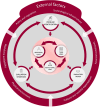Navigating complexity: a conceptual framework for simulation interventions
- PMID: 40619444
- PMCID: PMC12232773
- DOI: 10.1186/s41077-025-00366-y
Navigating complexity: a conceptual framework for simulation interventions
Abstract
Background: Healthcare systems are inherently complex, shaped by dynamic interactions and interdependencies rather than rigid structures. Simulation-based training interventions must embrace this complexity. Complex Adaptive Systems and Resilient Healthcare provide complementary theoretical frameworks for understanding how healthcare systems can respond to internal and external needs while maintaining adaptability and functionality. Incorporating concepts from Complex Adaptive Systems and Resilient Healthcare into simulation-based interventions increases the likelihood of their success within contemporary healthcare systems. A focus on adaptability, continuous learning, and system-wide resilience is necessary for healthcare improvement, and simulation interventions can help develop and reinforce these capabilities. In this article, we argue that simulation must be reimagined to reflect the realities of complex healthcare systems and propose a conceptual framework to support this shift.
Main body: We propose a three-component conceptual framework for simulation practitioners seeking to design and deliver interventions that embrace complexity: (1) Problem identification, (2) simulation design, and (3) evaluation strategies. The three components function across organizational levels, supporting a dynamic and adaptive approach to addressing healthcare system challenges. By integrating Complex Adaptive Systems and Resilient Healthcare principles, simulation-based interventions can foster a complexity-aware mindset, enabling healthcare professionals and organizations to anticipate, respond to, and recover from challenges more effectively. To illustrate this framework, we introduce three vignettes demonstrating how simulation-based interventions may benefit at different levels within healthcare systems. The vignettes illustrate how challenges at the institutional, departmental, and individual levels can be identified and addressed effectively by simulation-based interventions.
Conclusion: Simulation interventions can strengthen healthcare systems by supporting organizational learning and embedding principles from complexity science and resilience thinking. This requires reimagining simulation not as isolated training events but as complex interventions that operate across levels and respond to dynamic system needs. By adopting this systems-based approach, simulation practitioners, healthcare leaders, and policymakers can better align simulation with real-world conditions - bridging theory and practice while fostering more adaptive and resilient care.
© 2025. The Author(s).
Conflict of interest statement
Declarations. Competing interests: Victoria Brazil is a Senior Editor for Advances in Simulation.
Figures
References
-
- Kauffman SA. The Origins of Order : Self-Organization and Selection in Evolution. The Origins of Order. Published Online First: 10 June 1993. 10.1093/OSO/9780195079517.001.0001.
-
- Holland JH. Hidden Order : How Adaptation Builds Complexity. Reading: Addison-Wesley 1995.
LinkOut - more resources
Full Text Sources


